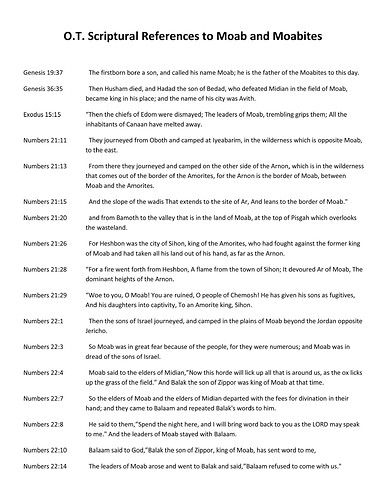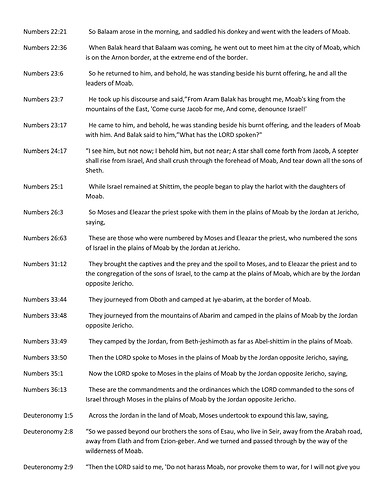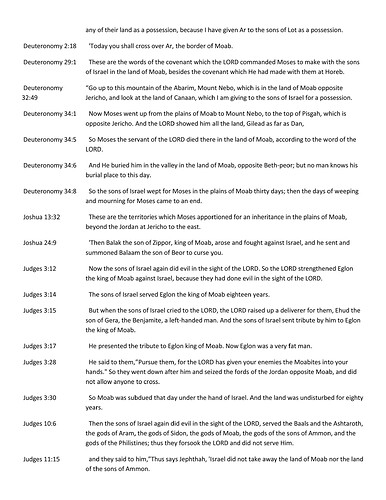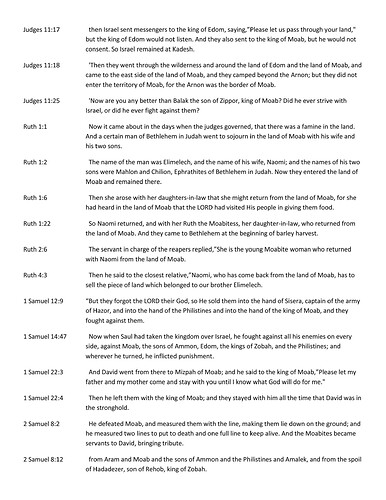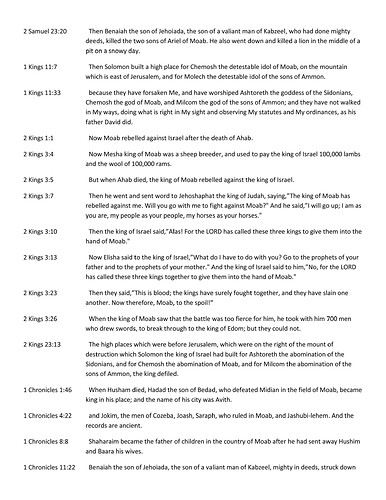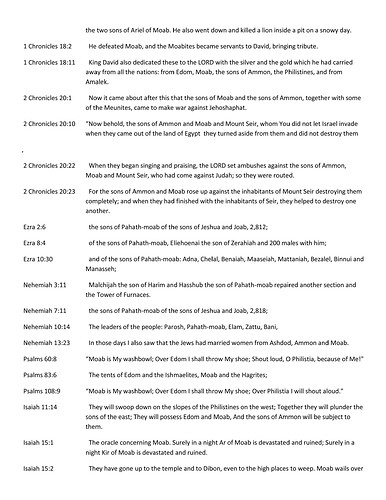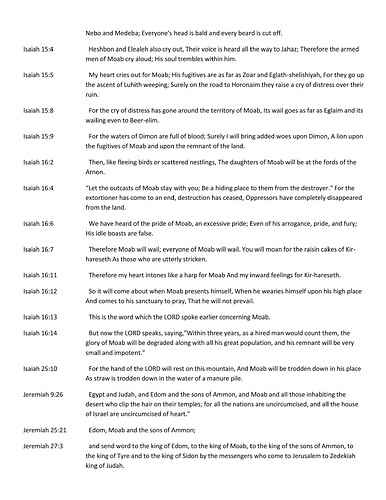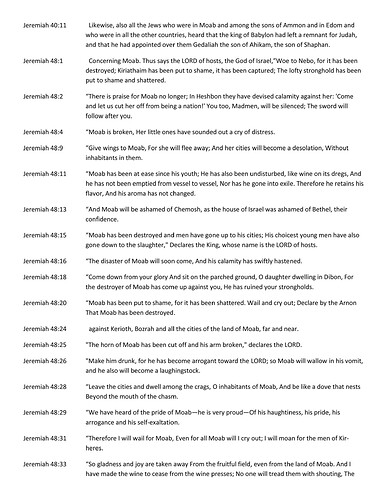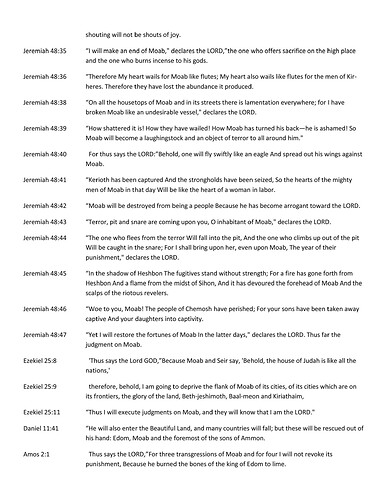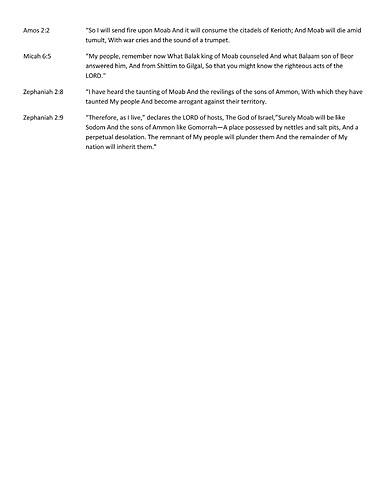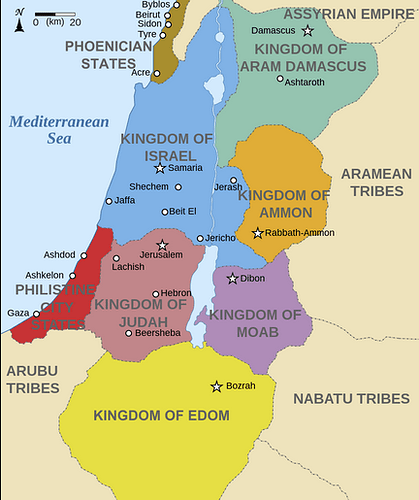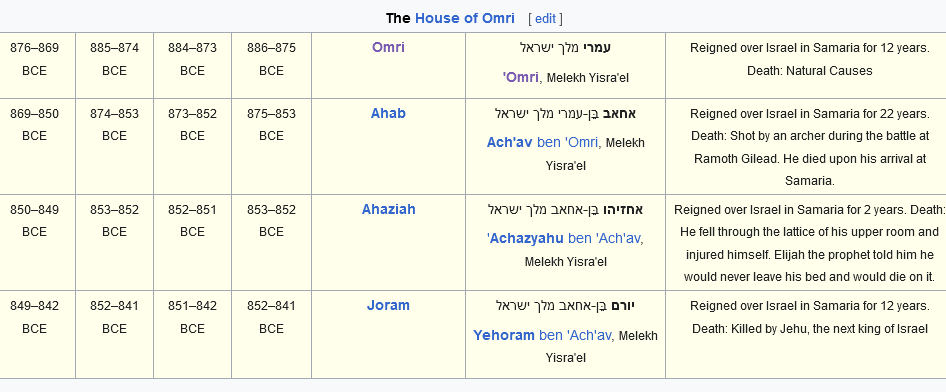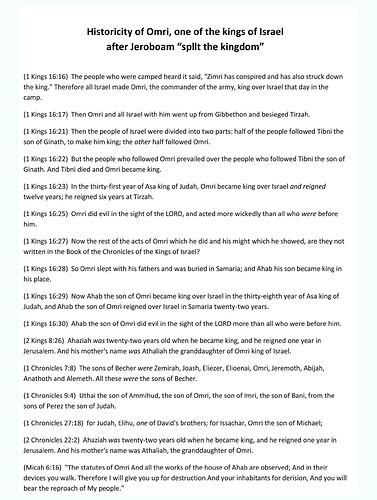- IMO, questioning the historicity of the Old Testament is the wrong way to go, when rewriting your Bibles. The all-or-none approach saves time and energy, of course, but if you were raised on Biblical Inerrancy & Historicity, chucking the Old Testament all at once can leave you feeling naked below the belt.
- I propose that we start small, perhaps with Moab and the Moabites.
- The question, then, to start with is:
I am aware of a reference by Egypt to conquering them c. 1250 BC, the Mesha stele, and a record of their being subservient to Assyria c. 740 BC. Otherwise, and outside of the Bible, “people lived here” is about it, I think.
- Then, perhaps, you’ll be as excited as I am to read about Moab in more detail, and about the Mesha Stele.
- The Mesha Stele is a really interesting archaeological find.
- Wikipedia: " The Mesha Stele, also known as the Moabite Stone, is a stele dated around 840 BCE containing a significant Canaanite inscription in the name of King Mesha of Moab (a kingdom located in modern Jordan. Mesha tells how Chemosh, the god of Moab, had been angry with his people and had allowed them to be subjugated to the Kingdom of Israel, but at length, Chemosh returned and assisted Mesha to throw off the yoke of Israel and restore the lands of Moab. Mesha also describes his many building projects. It is written in a variant of the Phoenician alphabet, closely related to the Paleo-Hebrew script
- It describes:
- How Moab was oppressed by Omri King of Israel and his son as the result of the anger of the god Chemosh.
- Mesha’s victories over Omri’s son (not named) and the men of Gad at Ataroth, Nebo and Jehaz.
- His building projects, restoring the fortifications of his strong places and building a palace and reservoirs for water.
- His wars against the Horonaim.
- A now-lost conclusion in the destroyed final lines.
So what is the problem here?
We know who Omri was…Omri - Wikipedia
The stone is written from the perspective of heathens who didnt know the Israelite God in Heaven.
Do you expect them to record Him in the same manner as the israelites do in the Bible? Why?
Im expecting that your next plan is to delve into the almost complete absence of any Egyptian historical accounts of the Exodus?
I think i see where this this thread is heading and i already have a defense which will shoot it in the foot (not kill it but wound enough to add significant doubt to its claims). Perhaps im misreading its intent, so i will reserve that defense for the time being.
- ]Source: King Mesha]
In the Books of Samuel account, Moab is said to have been conquered by David (traditional floruit c. 1000-970 BC) and retained in the territories of his son Solomon (d. c. 931 BC). Later, after the split of Israel into two kingdoms, King Omri of the northern kingdom of Israel, reconquered Moab after it had been lost subsequent to King Solomon’s reign. - The Mesha Stele, named after the Moabite king who erected it, makes no mention of earlier history and only mentions the conquest of the land by Omri. The stele records Mesha’s liberation of Moab from under the suzerainty of Israel in c. 850 BC. The liberation is stated directly in the Hebrew Bible in 2 Kings 3:5, which reads: “But it came to pass, when Ahab was dead, that the king of Moab rebelled against the king of Israel.”
2 Kings 3:4 reports the same events from the point of view of the Israelites, stating that “King Mesha of Moab … used to deliver to the king of Israel one hundred thousand lambs, and the wool of one hundred thousand rams”, before rebelling against “the king of Israel… Jehoram” (the Mesha Stele does not name the king against whom Mesha rebelled). The Second Book of Kings and the Mesha Stele differ in their explanation for the success of the revolt: according to Mesha, “Israel has been defeated”, but 2 Kings says the Israelites withdrew when Mesha sacrificed the eldest son of either himself or the Edomite king to his god Chemosh (the text is not explicit at this point) on the walls of the capital city in which he was being besieged. If the latter is the case, the interpretation would be that Mesha’s deed caused Edom to withdraw from the coalition. While it is plausible that one king held the eldest son of a neighbouring king hostage and sacrificed him when attacked, it is at least as plausible that he offered his own son to his main god in exchange for deliverance from destruction. Although the stele and the Bible do agree that the revolt occurred, the stele claims that Mesha won decisively, while the Bible conversely says that Israel did not suffer any losses. In any case, the effect stated in the Bible is remarkable. “And there came great wrath against Israel. And they withdrew from him and returned to their own land.”
- Other than the fact that you’re meddling in a thread to which you have no idea why I started it, there is no problem here. So, why are you in this thread?
- Your “we” know who Omri was, and if I never asked who Omri was and I know who Omri was, why are you here in this thread that I started? Are you looking for an excuse to argue?
- Does telling me and anybody else who bothers to read this thread lead you to believe that you’ve taught any of us something new? I read the stories of the Israelite kings before you were born.
- Asking a silly question and then, assuming a fact not in evidence, asking me “why?” only makes both questions silly, unless, of course, your goal is really to argue. Is that your goal?
- You “expect” prematurely and, without evidence, incorrectly.
- That would surprise me, since you’re “reserving your defense” because you concede that you may be misreading this thread’s intent. You’re shooting at a straw man that you yourself made. And you’re missing your target. I hope you’re not expecting a prize for all your blathering. I didn’t start this thread to make a fool out of you; but I have to say: I think a lot of us agree that you have.
I knew about that one; the Egypt mention is new to me.
I really have to keep up!
This topic was automatically closed 6 days after the last reply. New replies are no longer allowed.
